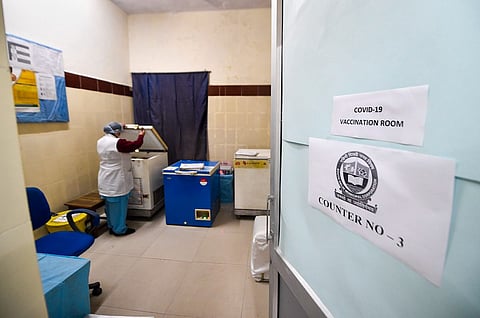

On Monday, Karnataka became the first Indian state to vaccinate over 2 lakh people against COVID-19. While no other state in India has done more, the state government’s own assessment shows that till Tuesday (January 16 to January 26), only 55% of the intended target has been reached. While 4.21 lakh people were set to be vaccinated in these 11 days, only 2.31 lakh were given the jab in Karnataka.
TNM spoke to various stakeholders in the vaccination process in the state to understand the challenges faced by authorities. The prime factors that came to the fore was the enrollment process, technical glitches with the Co-WIN app and vaccine hesitancy. While a majority of the beneficiaries want to get vaccinated, all staff in government institutions were enrolled en masse, said administrators. This meant that even those who wanted to stay away from the process were also counted as a target beneficiary.
In Bengaluru, all government hospitals were asked to submit their employee rolls by the Bruhat Bengaluru Mahanagara Palike (BBMP). The same was done by respective district authorities in other parts of the state. The Co-WIN app randomly selects 100 names from the pool of beneficiaries in each centre and updates them on their date of vaccination, a day in advance.
This centralised system has meant that the target itself has been inflated. A senior nurse in NIMHANS, Bengaluru got an SMS to come for vaccination even though she is pregnant. She said that many of her colleagues who are out of station had also got the SMS, and when they don’t show up, it is likely to impact the coverage percentage.
Dr Lakshmipathy, coordinator for COVID-19 vaccination at the KC General Hospital in Bengaluru said, “For the first two days, we could not start the drive as the app was not loading due to server problems. But from January 18 onwards, we have been able to carry out the process without any hindrance. Even then, the turnout has been low but is gradually picking up.”
As far as vaccine hesitancy is concerned, Dr Lakshmipathy said, “Initially there was natural hesitancy among beneficiaries and there were some refusing to take the vaccine citing comorbidities and other health conditions like cough and cold. Few people are scared to take it without any reason.”
Most of Lakshmipthy’s opinions were shared by Dr Nagaraj Naik, District Health Officer, Shivamogga district. He said, “It would have been better had the app allowed us to notify beneficiaries two days ahead of the vaccination instead of one day. This would allow us to call them and inform them, as some may not look at their messages. A provision to allow registered people to come to the session site at a convenient time may have also worked better.”
Dr Naveen Kumar, a senior resident doctor in Shivamogga Medical College, “Now that many people have already taken the vaccine and there are no reports of major side effects, many people who had earlier skipped the process, are coming back.”
He suggested other than the hesitancy, there are some issues with the app in peripheral areas.
Dr Lakshmipathy too, agreed. She said, “People who were not ready to take the vaccine on the first day have now come back. We are also offering an option to people who had missed the earlier appointment, who can be given the vaccine now. From our side, we are calling every beneficiary and requesting that they turn up.”
“Due to data mismatch or wrong data entry, some people who are willing and eligible for the vaccine did not get the SMS as their phone number was not updated. So now, we are asking them to come with their identity documents, so that we can vaccinate them. This facility was also not there in the app from the beginning,” she added.
With the second phase of COVID-19 vaccination set to roll out in little more than two weeks time in Karnataka, public health experts have suggested that the stumbling blocks in the first phase be negated to smoothen the process.
Dr Giridhar Babu, an epidemiologist with the Public Health Foundation of India and part of expert committees formed by the state and union government, said that vaccination should be carried out with a decentralised approach.
“The enrollment is based on the institutional database but after enrolling, there should have been a system to interact through the app with candidates. The scheduling should have ideally taken place in a better manner,” he said.
“The Indian government also acknowledges the issue with the Co-WIN app and they are saying that the app is a work in progress. Hopefully the app issues are fixed within this phase,” he added.